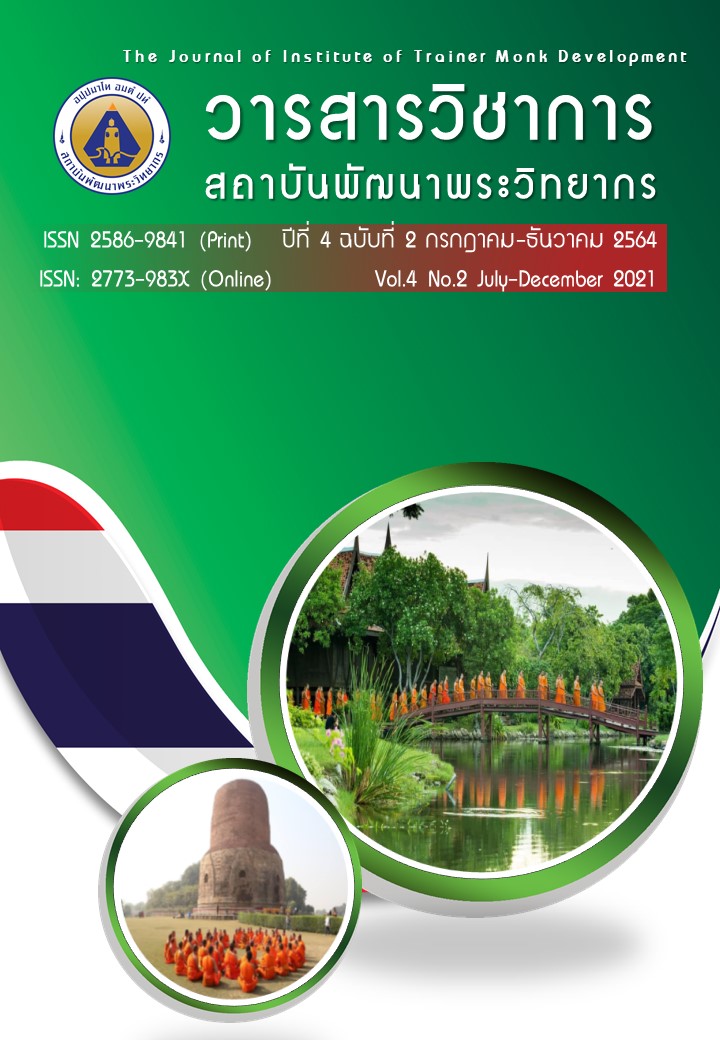จริยธรรมทางธุรกิจการขายออนไลน์ในพระพุทธศาสนาเถรวาท
Main Article Content
บทคัดย่อ
บทความนี้ มีวัตถุประสงค์เพื่อศึกษาจริยธรรมทางธุรกิจการขายออนไลน์ในพุทธศาสนา โดยศึกษาเชิงคุณภาพ พบว่า การขายออนไลน์เป็นช่องทางการจัดจำหน่ายที่มีการขายสินค้าอย่างรวดเร็ว สะดวก จึงเกิดผู้ขายเพิ่มขึ้นเป็นจำนวนมาก การแข่งขันเพิ่มสูงขึ้นอย่างรวดเร็ว ผลที่ตามมาคือเกิดความไม่ซื่อสัตย์ต่อลูกค้า และเกิดการแสวงหากำไรเกินควร ทำให้ลูกค้าไม่มั่นใจในการซื้อสินค้าออนไลน์ จากการศึกษาพบว่า พระพุทธเจ้าทรงวางจริยธรรมเป็นหลักเกณฑ์ในพุทธศาสนา เพื่อเป็นมาตรฐานความประพฤติของมนุษย์ เพื่อให้ดำเนินชีวิตตามอุดมคติของมนุษย์ พุทธจริยธรรมมี 3 ระดับ (1) พุทธจริยธรรมระดับต้น เน้นความสงบเรียบร้อยของสังคม หลักธรรม คือ เบญจศีล เบญจธรรม 6 ตามหลักพุทธศาสนา คือ ศีล เป็นข้อปฏิบัติเริ่มแรกสุด ในการขายออนไลน์ ศีลที่นำมาใช้ คือ ศีลข้อที่ 2 อทินนาทานา เวรมณี คือ การไม่ฉ้อโกง การไม่ทุจริตกับลูกค้า ศีลข้อที่ 4 มุสาวาทา เวรมณี คือ การไม่เบียดเบียนผู้อื่นด้วยคำวาจาที่เป็นเท็จ หลอกลวง (2) พุทธจริยธรรมระดับกลาง เข้าใจตนเองในฐานะผู้ขายออนไลน์ ด้วยหลักธรรม คือ กุศลกรรมบถ 10 คือการขายออนไลน์มีเจตนาที่เกี่ยวข้องกับทรัพย์ของผู้อื่นและการสื่อสาร จิตใจของผู้ขายจึงต้องมีเจตนาที่บริสุทธิ์จึงจะนำไปสู่การขายที่บริสุทธิ์ได้ (3) พุทธจริยธรรมระดับสูง เป็นการดำเนินชีวิตแบบทางสายกลาง ตามหลักธรรม คือ มรรค การขายต้องมีการวางผลประโยชน์ไว้เสมอกันระหว่างผู้ซื้อกับผู้ขาย เพื่อให้เกิดความพึงพอใจทั้ง 2 ฝ่าย ทั้งนี้การขายออนไลน์จึงจำเป็นต้องมีหลักธรรมเข้ามาช่วยสนับสนุนเพื่อให้เป็นแนวทางในการดำเนินธุรกิจอย่างซื่อสัตย์ต่อลูกค้า มีเมตตาธรรม โดยใช้พรหมวิหาร 4 นอกจากนี้ยังใช้สังคหวัตถุ 4 เป็นการให้สงเคราะห์ซึ่งกันและกัน
Article Details
บทความที่ได้รับการตีพิมพ์เป็นลิขสิทธิ์ของวารสารวิชาการสถาบันพัฒนาพระวิทยากร
ข้อความที่ปรากฎอยู่ในบทความที่ได้รับการตีพิมพ์ในวารสาร ถือเป็นความรับผิดชอบของผู้เขียนบทความ และข้อคิดเห็นนั้นไม่ถือว่าเป็นทัศนะและความรับผิดชอบของกองบรรณาธิการวารสารวิชาการสถาบันพัฒนาพระวิทยากร
เอกสารอ้างอิง
จินตนา บุญบงการ. (2558). จริยธรรมทางธุรกิจ. พิมพ์ครั้งที่ 16. อยุธยา: โรงพิมพ์แห่งจุฬาลงกรณ์มหาวิทยาลัย.
ฉวีวงศ์ บวรกีรติขจร. (2560). การศึกษาการซื้อขายสินค้ากลุ่มแฟชั่นในสื่อสังคมออนไลน์. Veridian E-journal,Silpakorn University ฉบับภาษาไทย สาขามนุษยศาสตร์สังคมศาสตร์ และศิลปะ. 10(2), 2056-2071.
เปรมกมล หงส์ยนต์. (2562). ปัจจัยที่มีอิทธิพลต่อการตัดสินใจซื้อสินค้าผ่านทางแอพพลิเคชั่นออนไลน์ (ลาซาด้า) ของผู้บริโภคยุคดิจิทัลในกรุงเทพ (สารนิพนธ์บริหารธุรกิจมหาบัณฑิต) . มหาวิทยาลัยสยาม.
พัฒน์นรี ฉัตรพิสุทธิ์. (2560). พุทธจริยธรรมสำหรับผู้ประกอบธุรกิจอสังหาริมทรัพย์. วารสาร มจร การพัฒนาสังคม. (1), 86-96.
มหาจุฬาลงกรณราชวิทยาลัย. (2539). พระไตรปิฎกภาษาไทย ฉบับมหาจุฬาลงกรณราชวิทยาลัย. กรุงเทพมหานคร : โรงพิมพ์มหาจุฬาลงกรณราชวิทยาลัย.
ลลิมาดา ศรีจำรูญ. (2563). ศึกษาวิเคราะห์เรื่องศีลกับการทำธุรกิจในพระพุทธศาสนาเถรวาท. วารสาร มจร พุทธศาสตร์ปริทรรศน์, 4(2), 34-48.
วาสนา อินทสง. (2559). การศึกษาพฤติกรรมผู้บริโภคและปัจจัยส่วนประสมทางการตลาด ของธุรกิจคลินิกเสริมความงามที่ส่งผลต่อความภักดีของลูกค้า. (สารนิพนธ์บริหารธุรกิจมหาบัณฑิต). มหาวิทยาลัยธรรมศาสตร์.
หรรษมน เพ็งหมาน. (2559). จริยธรรมทางธุรกิจเพื่อความยั่งยืนของธุรกิจค้าปลีก. Veridian E-Journal. Silpakorn University ฉบับภาษาไทย สาขามนุษยศาสตร์ สังคมศาสตร์ และศิลปะ, 9(1), 815-828.
Anonymous. (2557).“จริยธรรมการทำธุรกิจออนไลน์. สืบค้นเมื่อวันที่ 24 เมษายน 2564, จาก http://ethicse-commerce.blogspot.com.
MOLEK. (2560). คิดเรื่องกำไรให้น้อยลง และเพิ่มความเป็นมนุษย์ให้มากขึ้น นี้คือธุรกิจในยุคหน้า MARKETING OPPS. สืบค้นเมื่อวันที่ 31 มีนาคม 2564, จาก
HTTPS://WWW.MARKETINGOOPS.COM/EXCLUSIVE/LESS-PROFIT-FOR-MORE-HUMANITY-THE-NEXT-BUSINESS.
สิริวรรณ สุทธบุญธรรม. (2564). การขายออนไลน์. สืบค้นเมื่อวันที่ 10 เมษายน 2564, จาก http://siriwan40.blogspot.com/p/1.html.


